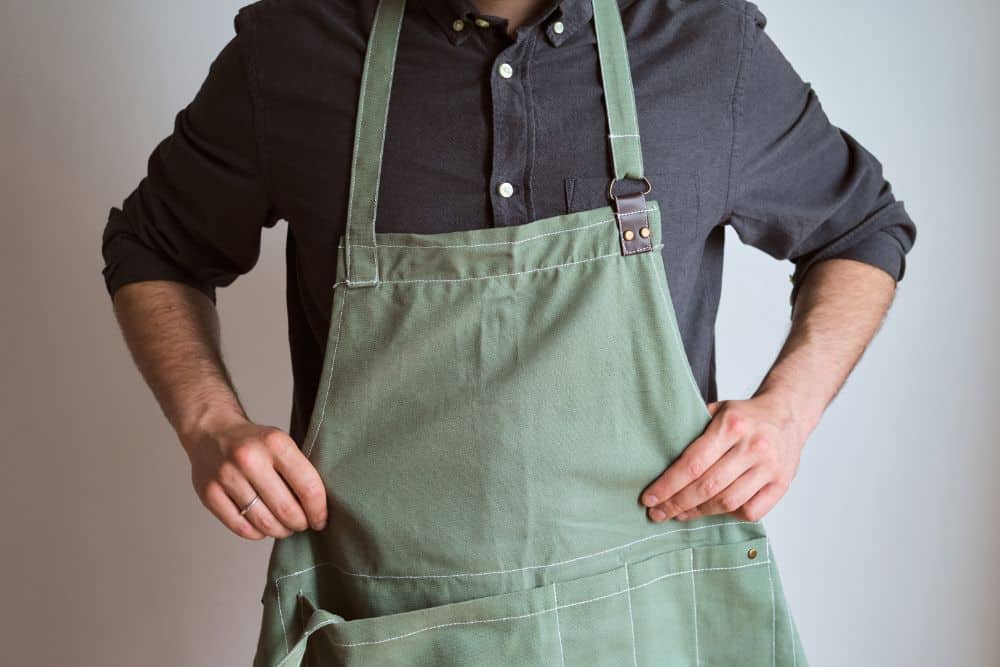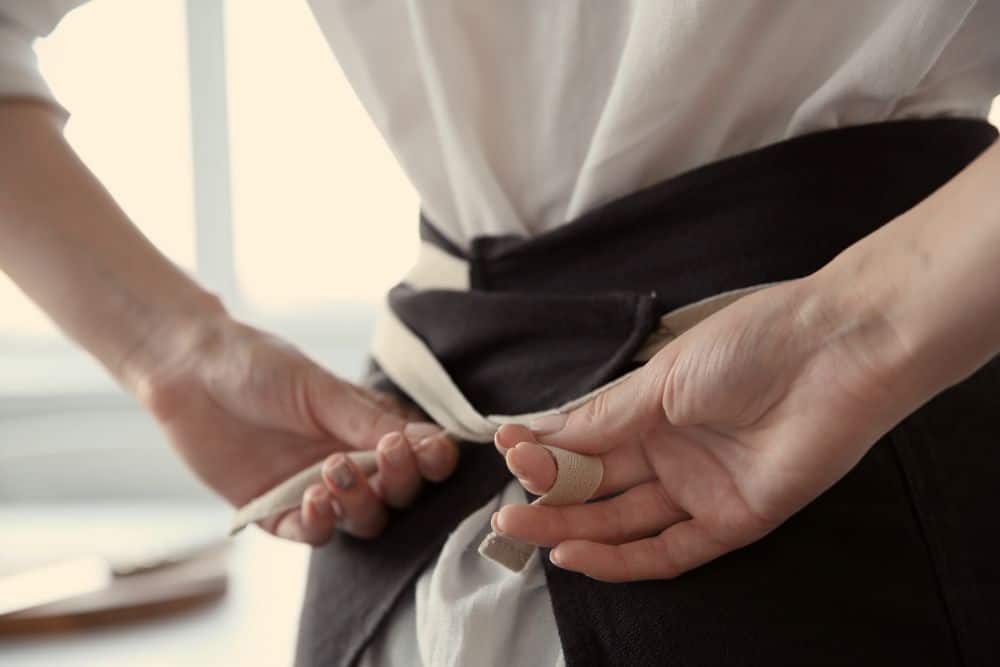You’ve been cooking for hours. There are two simmering pots on the stovetop, a chicken roasting in the oven, a timer going off, and suddenly the urge hits. You need to use the bathroom. You’ll be in and out so quickly. Should I remove my apron before using the bathroom? Does it even matter?
Yes, it matters. For proper food safety and hygiene, you should always remove your apron before using the bathroom.
Aprons look cute. They often have pockets for the things you need close at hand. It’s nice to have another layer between you and hot, spattering oil from deep-frying in your Dutch oven. But not everyone likes how aprons fit or look. Does it matter if you wear an apron?
Whether you’re clumsy with the sauces or apt to wipe your flour-coated hands on your black pants, aprons provide a shield so you can enjoy the fruits of your labor without a wardrobe change.

In short, your apron gets dirty so your clothes don’t.
If it is going to get dirty anyway, why should you remove your apron when you use the bathroom?
Aprons don’t just keep your clothes safe from your food. They also keep your food safe from your clothes.
Most likely, before beginning food preparation, you’ve been wearing your clothes all day. You’ve sweated in them, taken the dog to the park in them, changed a baby in them, took out the trash in them, sat in a booth at a greasy diner in them. Your clothes carry dirt, germs, and bacteria.
Wearing an apron over your clothes keeps whatever you’ve come in contact with from getting into your food.
Wearing your apron to the bathroom risks exposing it to body fluid and bacteria. Even if you remove your apron in the bathroom, it will come in contact with bacteria from the sink and walls and from the bacteria released into the air when the toilet is flushed.
So if you’re wondering “Why should I remove my apron before using the bathroom?”Know that removing your apron before using the bathroom is a matter of disease control.
If the urge to use the bathroom hits while preparing food, make sure it is safe to leave the kitchen. You do not want to leave a hot pan unattended.
Next, remove your apron and either hang it up if you have a hook or put it somewhere clean in your kitchen where it will not come in contact with contaminants.
Finally, it might sound counterintuitive, but before using the bathroom, wash your hands. It is always important to wash your hands immediately after handling raw ingredients.

But if you’ve been handling peppers, citrus, or anything acidic, you’ll want to wash your hands before coming in contact with sensitive areas of your body.
After using the bathroom, wash your hands using the proper hand washing technique for good hand hygiene.
After using the bathroom and washing your hands, put your clean apron back on and resume food preparation.
“Should I remove my apron before using the bathroom?” Yes. But when else?
Keep your food safe from cross-contamination by following this routine before and after any unsanitary activity, including:
It is a good idea to remove your apron whenever leaving the kitchen. When you get into this habit, it will significantly decrease the possibility of cross-contamination from your apron.

Wearing an apron while cooking can help keep you safe from food-borne illness, but you must ensure your apron stays clean and safe.
Resist the urge to clean or dry your hands on your apron. If you’ve been handling raw meat, eggs, or other potentially hazardous foods, you’ll be increasing the chances for cross-contamination. Rinse or wash your hands when dirty, or use a glove you change often.
Have at least one extra clean apron ready to go at any time. That way, if you spill chicken juice on your apron or accidentally use the bathroom with your apron on, you can easily throw it in the washing machine and switch it out for the clean one.
Cleaning your aprons regularly keeps them safe for use around food. Wash your apron after every other use or whenever it has visible stains or signs of dirt.
Follow the instructions on your apron’s tag to ensure proper washing procedure. Use a spot-removing pre-treatment to deal with stubborn stains. Wash with a strong, trusted detergent.
Do not use bleach unless the instructions explicitly say you can.
After washing hang or fold your aprons and store them in a clean, dry place to be ready for their next use.
